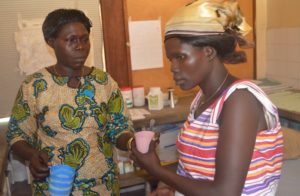Daily text messages reminding health workers to encourage pregnant women to take their antimalarial drugs are helping to significantly improve uptake of the treatment in Uganda.
The text message pilot is part of a wider project being led by COMDIS-HSD partners, Malaria Consortium. The project aims to identify and address the factors that prevent women from receiving and taking the proper preventive malaria treatments during pregnancy.
Malaria in pregnancy poses substantial risks to mother and unborn child, including maternal anaemia, stillbirth, miscarriage and low birth weight – a leading cause of child mortality. The World Health Organization (WHO) recommends intermittent preventative treatment in pregnancy (IPTp). This is a full therapeutic course of antimalarial medicine given to pregnant women living in areas of moderate or high transmission, regardless of whether or not they are infected with malaria, to prevent malaria infections.
However, our research in Uganda has found mixed knowledge among health workers regarding IPTp guidelines, as well as the fact they do not always offer IPTp or encourage women to take it.
Designed to complement the standard training on malaria in pregnancy, the text message intervention involves sending daily reminders to health workers for five weeks, summarising the key points of the training.
- 6 months after the training, health workers who received training plus text messages had a better recollection of IPTp guidelines than health workers who had received only training.
- In health facilities where health workers received the text messages, the coverage among women of the third and fourth IPTp doses was almost double that in health facilities where the text message system was not implemented.
Based on these promising results, the Ministry of Health in Uganda, which has been involved in the design and implementation of the study, has decided that instructions on sending text message reminders should be added to the national malaria in pregnancy training guidelines.
- Read more about our work on Assessing and addressing barriers to IPTp uptake in Uganda.


